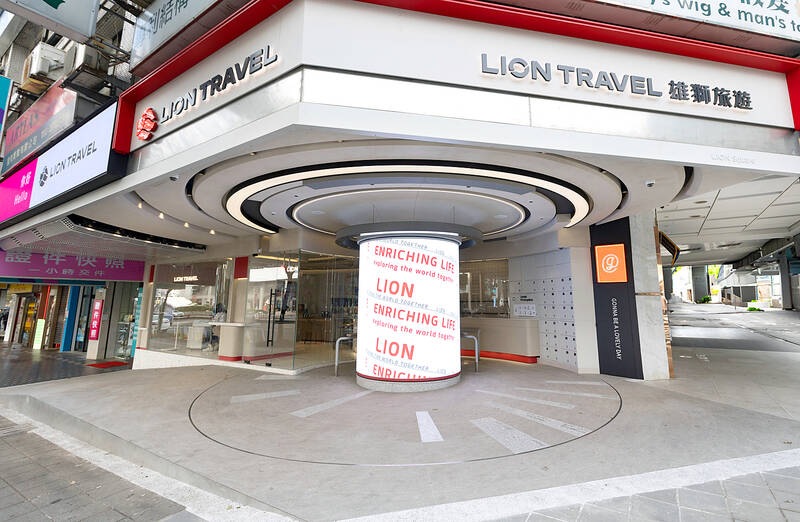Lion Travel Service Co (雄獅旅行社) yesterday said that it will raise wages by up to 20 percent to retain employees and expand its workforce, as outbound travel increases in the post-COVID-19 era.
The company plans to invest NT$100 million (US$3.29 million) this year by raising wages 10-20 percent for employees based on their performance, position and original salary level, Lion Travel said.
After the upcoming wage adjustments, more than 95 percent of the company’s employees are expected to see their guaranteed wage rise, Lion Travel said, adding that it will provide appropriate bonuses to employees as further incentives.

Photo courtesy of Lion Travel Service Co
“The company has acknowledged that competitive wages serve as an important foundation to retain employees and attract talent,” Lion Travel said.
The NT$100 million budget represents an almost 10 percent increase from last year.
Lion Travel has 1,800 employees around the world, operates 26 outlets in Taiwan and nine overseas, covering business in Taiwan, China, Hong Kong, East Asia, Southeast Asia, the Americas, Europe and Oceania, the company said.
In addition to the wage hikes, Lion Travel will allocate part of the planned NT$100 million to recruit more than 500 new staff this year in a wide range of fields, including artificial intelligence-related digital technologies, marketing, itinerary design and business management, it said.
The company has also introduced measures to improve employee welfare, including the establishment of a stock trust funded by a provident fund, allowing employees to hold company shares — a way for them to grow with the company. Lion Travel said that nearly 70 percent of employees have joined the trust.
Amid strong demand for outbound travel, Lion Travel posted its highest-ever first-quarter net profit of NT$426 million, up 30.95 percent from a year earlier with earnings per share at NT$4.57, compared with NT$3.47 a year earlier.
Despite uncertainties created by US President Donald Trump’s administration and volatility in the foreign exchange market, Lion Travel’s products in the North American market remain competitive, while demand for destinations in Japan remains strong for the upcoming summer vacation, the company said.
According to data compiled by the Tourism Administration, the number of outbound travelers from Taiwan hit 16.65 million last year, up 42.84 percent from a year earlier.
In the first two months of this year, the number rose 13.03 percent from a year earlier to 3.03 million, the data showed.

RECYCLE: Taiwan would aid manufacturers in refining rare earths from discarded appliances, which would fit the nation’s circular economy goals, minister Kung said Taiwan would work with the US and Japan on a proposed cooperation initiative in response to Beijing’s newly announced rare earth export curbs, Minister of Economic Affairs Kung Ming-hsin (龔明鑫) said yesterday. China last week announced new restrictions requiring companies to obtain export licenses if their products contain more than 0.1 percent of Chinese-origin rare earths by value. US Secretary of the Treasury Scott Bessent on Wednesday responded by saying that Beijing was “unreliable” in its rare earths exports, adding that the US would “neither be commanded, nor controlled” by China, several media outlets reported. Japanese Minister of Finance Katsunobu Kato yesterday also

Jensen Huang (黃仁勳), founder and CEO of US-based artificial intelligence chip designer Nvidia Corp and Taiwan Semiconductor Manufacturing Co (TSMC, 台積電) on Friday celebrated the first Nvidia Blackwell wafer produced on US soil. Huang visited TSMC’s advanced wafer fab in the US state of Arizona and joined the Taiwanese chipmaker’s executives to witness the efforts to “build the infrastructure that powers the world’s AI factories, right here in America,” Nvidia said in a statement. At the event, Huang joined Y.L. Wang (王英郎), vice president of operations at TSMC, in signing their names on the Blackwell wafer to

‘DRAMATIC AND POSITIVE’: AI growth would be better than it previously forecast and would stay robust even if the Chinese market became inaccessible for customers, it said Taiwan Semiconductor Manufacturing Co (TSMC, 台積電) yesterday raised its full-year revenue growth outlook after posting record profit for last quarter, despite growing market concern about an artificial intelligence (AI) bubble. The company said it expects revenue to expand about 35 percent year-on-year, driven mainly by faster-than-expected demand for leading-edge chips for AI applications. The world’s biggest contract chipmaker in July projected that revenue this year would expand about 30 percent in US dollar terms. The company also slightly hiked its capital expenditure for this year to US$40 billion to US$42 billion, compared with US$38 billion to US$42 billion it set previously. “AI demand actually

RARE EARTHS: The call between the US Treasury Secretary and his Chinese counterpart came as Washington sought to rally G7 partners in response to China’s export controls China and the US on Saturday agreed to conduct another round of trade negotiations in the coming week, as the world’s two biggest economies seek to avoid another damaging tit-for-tat tariff battle. Beijing last week announced sweeping controls on the critical rare earths industry, prompting US President Donald Trump to threaten 100 percent tariffs on imports from China in retaliation. Trump had also threatened to cancel his expected meeting with Chinese President Xi Jinping (習近平) in South Korea later this month on the sidelines of the APEC summit. In the latest indication of efforts to resolve their dispute, Chinese state media reported that